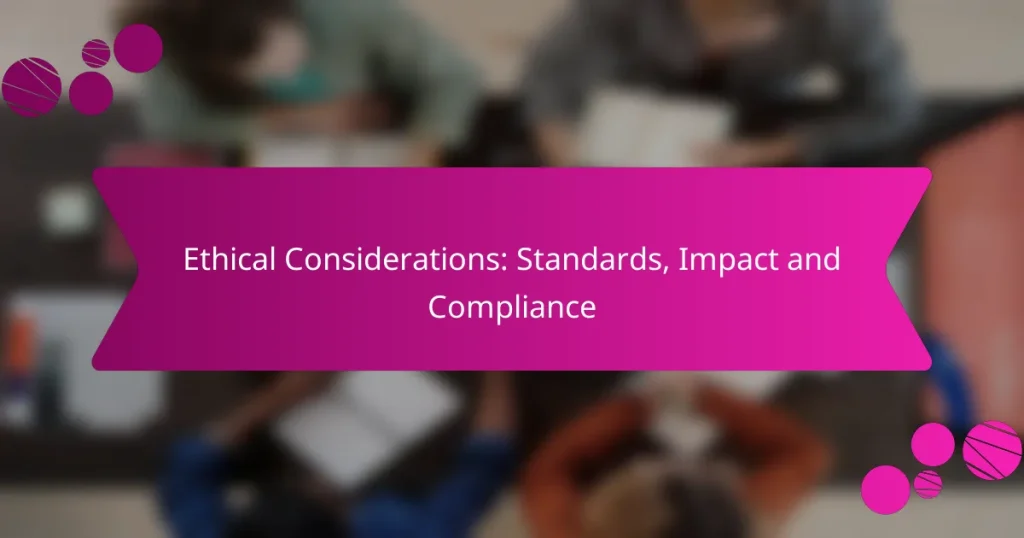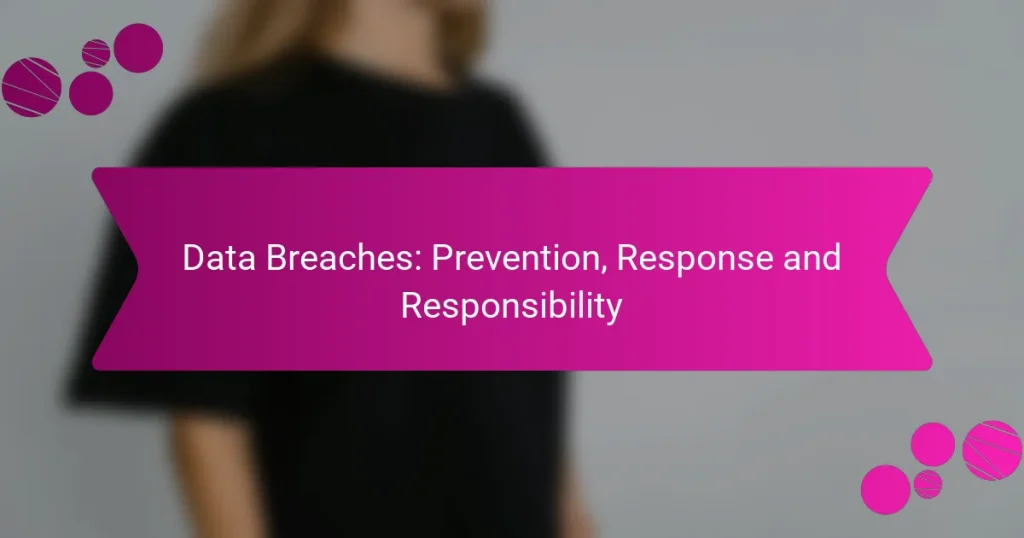In today’s digital landscape, online survey tools play a vital role in ensuring compliance and ethical standards in research. Platforms like Qualtrics, SurveyMonkey, and Google Forms are designed to facilitate data protection, user consent, and transparency, aligning with legal regulations. By prioritizing informed consent and participant rights, these tools help maintain the integrity of research and foster trust among respondents.
Transparency in Surveys: Trust, Engagement and Credibility
Consent Communication: Clarity, Methods and Best Practices
Cultural Sensitivities: Awareness, Adaptation and Respect
Anonymity in Surveys: Techniques, Challenges and Benefits
Data Breaches: Prevention, Response and Responsibility
GDPR Compliance: Requirements, Implications and Enforcement
What are the best online survey tools for compliance and ethics?
Some of the best online survey tools for compliance and ethics include Qualtrics, SurveyMonkey, Google Forms, Typeform, and Microsoft Forms. These platforms offer features that help ensure data protection, user consent, and ethical survey practices.
Qualtrics
Qualtrics is a robust survey tool known for its advanced compliance features. It offers built-in data protection measures and allows users to customize consent forms to meet regulatory requirements such as GDPR and HIPAA.
With its extensive analytics capabilities, Qualtrics enables organizations to track responses and ensure ethical standards are maintained throughout the survey process. It is particularly suited for large enterprises that require comprehensive reporting and data management.
SurveyMonkey
SurveyMonkey provides a user-friendly interface and a variety of templates that help users create compliant surveys quickly. It includes features for anonymous responses, which can enhance ethical considerations by protecting participant identities.
The platform also offers compliance certifications, making it easier for organizations to adhere to regulations. However, users should be aware of the limitations on data export options in the free version, which may impact larger projects.
Google Forms
Google Forms is a free tool that allows users to create simple surveys with ease. While it lacks some advanced compliance features, it integrates well with Google Workspace, making it convenient for organizations already using those tools.
Users should ensure they have proper consent mechanisms in place, as Google Forms does not automatically include them. It is best for small-scale surveys where budget constraints are a concern.
Typeform
Typeform stands out for its engaging design and user experience, making surveys more interactive. It offers features like logic jumps and customizable templates, which can enhance participant engagement while maintaining ethical standards.
Typeform also provides options for data encryption and compliance with GDPR, but users must actively implement these features. It is ideal for businesses looking to create visually appealing surveys without sacrificing compliance.
Microsoft Forms
Microsoft Forms is a straightforward tool that integrates seamlessly with other Microsoft applications. It offers basic compliance features, including data encryption and secure sharing options, making it suitable for organizations already using Microsoft 365.
While it may not have the advanced features of other tools, its simplicity and ease of use make it a good choice for quick surveys. Users should ensure they review their organization’s data policies to maintain compliance effectively.
How do online survey tools ensure compliance with regulations?
Online survey tools ensure compliance with regulations by incorporating features that align with legal standards, such as data protection laws. These tools often include mechanisms for obtaining consent, managing data securely, and providing transparency in data usage.
GDPR compliance features
GDPR compliance is crucial for any online survey tool operating in or targeting users in the European Union. Key features include obtaining explicit consent from respondents before collecting personal data, allowing users to access and delete their data, and implementing data minimization practices.
Survey tools may also offer options for anonymizing responses to protect user identity. Additionally, they often provide clear privacy policies that outline how data will be used, ensuring transparency and trust with participants.
HIPAA compliance options
For surveys involving health information in the United States, HIPAA compliance is essential. Online survey tools can offer Business Associate Agreements (BAAs) to ensure that they adhere to HIPAA regulations when handling Protected Health Information (PHI).
These tools often include features such as secure data storage, restricted access controls, and encrypted communications to protect sensitive health data. Users should verify that the tool they choose explicitly states its HIPAA compliance capabilities.
Data encryption practices
Data encryption is a critical practice for safeguarding information collected through online surveys. Many survey tools utilize encryption protocols, such as SSL/TLS, to protect data during transmission, ensuring that responses are secure from interception.
Additionally, some tools offer end-to-end encryption, meaning that data remains encrypted while stored and can only be decrypted by authorized users. When selecting a survey tool, check for encryption standards and practices to ensure robust data protection.
What ethical considerations should be taken into account in surveys?
Ethical considerations in surveys are crucial to ensure the integrity of the research and the protection of participants. Key aspects include informed consent, data anonymity, and participant rights, all of which help maintain trust and compliance with ethical standards.
Informed consent
Informed consent requires that participants are fully aware of the survey’s purpose, procedures, risks, and benefits before agreeing to take part. This means providing clear information in understandable language, allowing participants to ask questions, and ensuring they can withdraw at any time without penalty.
To facilitate informed consent, consider using a consent form that outlines all relevant details. This form should be easily accessible and presented before the survey begins, ensuring participants have ample time to review it.
Data anonymity
Data anonymity is essential to protect participants’ identities and personal information. Surveys should be designed to collect data in a way that does not allow for the identification of individual respondents, such as using unique identifiers instead of names.
Implementing measures like data encryption and secure storage can further enhance anonymity. Always inform participants about how their data will be used and assure them that their responses will remain confidential.
Participant rights
Participants have rights that must be respected throughout the survey process. These include the right to privacy, the right to withdraw, and the right to receive information about the findings if they wish. Researchers should clearly communicate these rights to participants at the outset.
Additionally, it is important to adhere to relevant regulations, such as the General Data Protection Regulation (GDPR) in Europe, which emphasizes the protection of personal data and the rights of individuals. Ensuring compliance with these regulations not only protects participants but also enhances the credibility of the research.
How can organizations implement ethical survey practices?
Organizations can implement ethical survey practices by establishing clear guidelines and ensuring transparency throughout the survey process. This involves developing a code of ethics and training staff on ethical standards to protect respondents’ rights and maintain data integrity.
Developing a code of ethics
Creating a code of ethics is essential for guiding survey practices. This code should outline principles such as respect for participants, confidentiality, and the responsible use of data. Organizations can refer to established frameworks, like the American Psychological Association’s Ethical Principles, to shape their guidelines.
Additionally, the code should be easily accessible to all staff involved in survey administration. Regular reviews and updates to the code will help ensure it remains relevant and aligned with current ethical standards and regulations.
Training staff on ethical standards
Training staff on ethical standards is critical for effective implementation of the code of ethics. This training should cover topics such as informed consent, data privacy, and the importance of unbiased questioning. Workshops and role-playing scenarios can enhance understanding and retention of these concepts.
Organizations should consider ongoing training sessions to address new ethical challenges as they arise. Providing resources, such as a quick-reference guide or checklist, can help staff remember key ethical practices during survey administration.
What are the key features to look for in a compliant survey tool?
A compliant survey tool should prioritize data security, customizable consent forms, and robust reporting capabilities. These features ensure that the survey process adheres to legal standards while maintaining participant trust and providing valuable insights.
Data security measures
Data security measures are essential for protecting sensitive information collected during surveys. Look for tools that offer encryption, secure data storage, and access controls to prevent unauthorized access. Compliance with regulations such as GDPR or HIPAA is crucial for ensuring that personal data is handled appropriately.
Consider tools that provide regular security audits and vulnerability assessments. This proactive approach helps identify and mitigate potential risks, ensuring that participant data remains safe throughout the survey process.
Customizable consent forms
Customizable consent forms are vital for obtaining informed consent from survey participants. A compliant survey tool should allow you to tailor consent forms to clearly explain the purpose of the survey, how data will be used, and participants’ rights. This transparency fosters trust and encourages participation.
Ensure that the tool supports various consent options, such as explicit consent for sensitive data or implied consent for general surveys. This flexibility helps you adhere to different regulatory requirements while accommodating diverse participant needs.
Reporting and analytics capabilities
Robust reporting and analytics capabilities enable you to derive actionable insights from survey data. A good survey tool should offer features like real-time data visualization, customizable reports, and the ability to segment data by demographics or responses. These functionalities help you make informed decisions based on participant feedback.
Look for tools that provide export options in various formats, such as CSV or PDF, to facilitate sharing and further analysis. This ensures that you can easily integrate survey findings into your broader research or business strategies.






